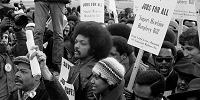
Un Article du Northstar News Today – 19 avril 2015
BY Linn Washington Jr.
NEW YORK — Racism is a topic that usually divides black and white Americans. However, iconic civil rights activist Rev. Jesse Jackson said there is one contentious race-mired issue where blacks and whites seemingly share a similar posture.
Rev. Jesse Jackson Sr. and Mireille Fanon-Mendes-France, Frantz Fanon’s daughter, speak at the National/International Reparations Conference last week in New York.
Rev. Jesse Jackson and Mirelle Fanon-Mendes-France, Frantz Fanon’s daughter, spoke at the National/International Reparations Conference last week in New York. Photo by Linn Washington, Jr.
“Blacks and whites have one thing in common. They will not discuss reparations,” Jackson said, defining reparations for slavery and post-slavery institutional racism as “repair for damage done.”
This common aversion among blacks and whites to address reparations comes from “different reasons” Jackson noted.
“On the topic of reparations, whites are in denial and blacks think reparations cannot be attained.”
Rev. Jackson offered his assessment of America’s reparations-denial-dynamic during his keynote address at the opening session of the International Reparations Summit held recently in New York City. Participants for that three-day conference came from three continents. The Institute of the Black World 21st Century, a research, policy and advocacy organization based in the United States convened the Summit.
Dr. Ron Daniels, President of the Institute, stated, “We are delighted that the Institute of the Black World can be a clearinghouse for ideas and strategies on how to pursue reparations for historical crimes and injustices against people of African descent in the U.S. and across the Americas.”
One participant at that Summit was Mirelle Fanon-Mendes-France, the daughter of the legendary intellectual-activist-author Franz Fanon. She is president of the Franz Fanon Foundation. The writings of Franz Fanon have provided inspiration for legions of reparations advocates.
“Apologies cannot compensate for the injustices of slavery and colonialism. The time is now for concerted progress on economic and political compensation,” the internationally respected human rights activist Fanon-Mendes-France said during her remarks at the opening session of the Summit.
An action in 2013 reenergized reparations activities already operative in the U.S., throughout the Americas, in Africa and in Europe. That year CARICOM, the organization of Caribbean nations, announced its plans to mount actions against former European colonial countries for the slave trade, colonialism and genocide against indigenous peoples. CARICOM’s announcement was the first time that a collection of countries formally agreed to mount coordinated action for reparations.
“We have a just cause. And we have a duty to right the wrongs done during the slave trade, slavery and colonialism,” CARICOM representative Dr. Douglas Slater said during the opening session of the Summit. “Today, racism continues to impede development of African peoples all over the world.”
The Summit featured a special event honoring U.S. Congressman John Conyers (D., Mich.) who, in January 1989, introduced a measure in Congress to establish a national commission to study the issue of reparations in the United States. However, Congressional leaders — Republicans and Democrats — have persistently refused even to allow a vote on Conyers’ measure that would simply study the issue of reparations, not directly allocate monetary or other compensation.
http://www.northstarnewstoday.com/news/reparations-activists-ready-for-new-phase-in-long-struggle/

